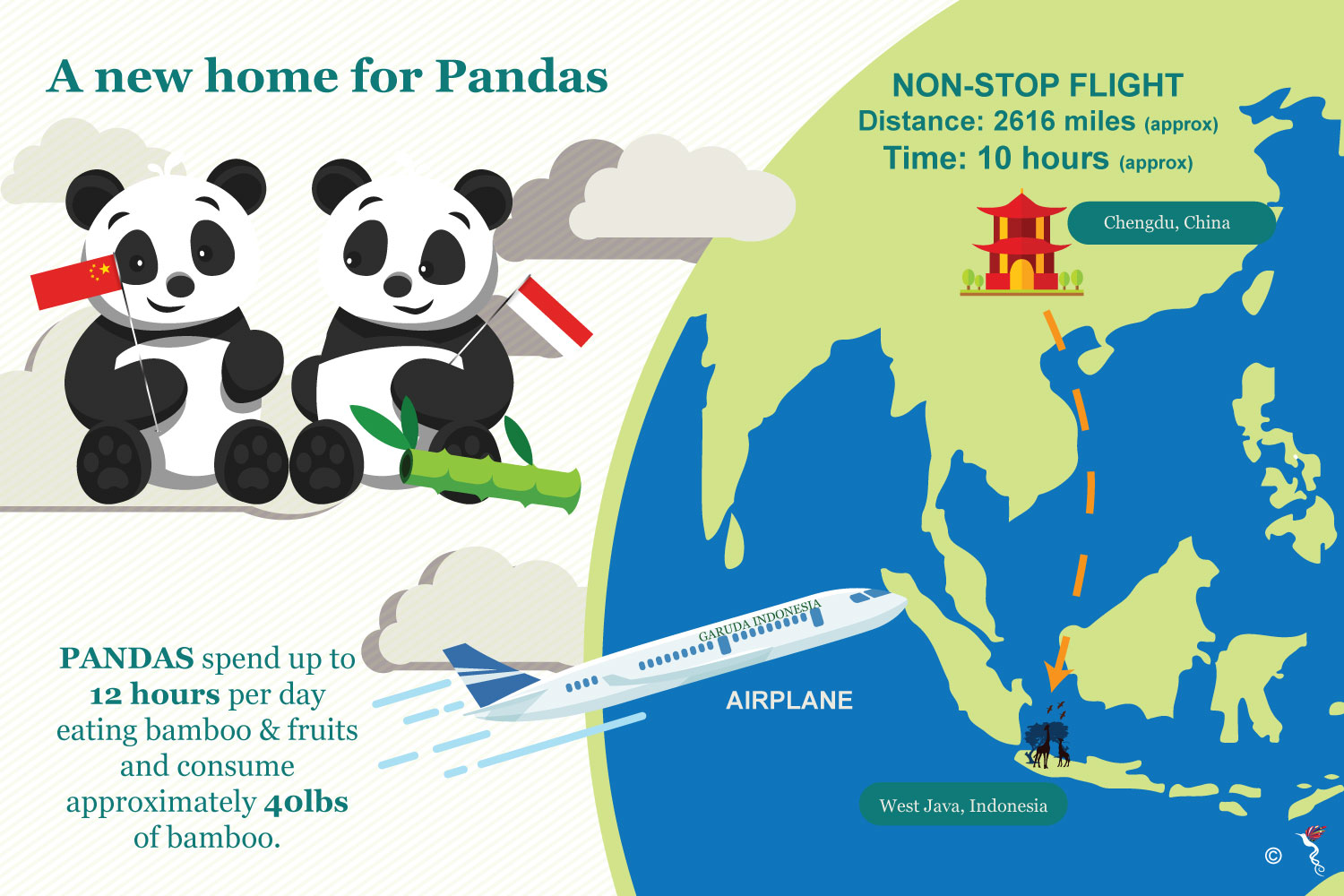“Many people don’t realise it, but there are actually two Chinese ambassadors in Washington: me and the panda cub at the National Zoo,” wrote Chinese ambassador to the US, Cui Tiankai, in his opinion piece published by The Washington Post in 2013. Fair enough, the pandas are just as important as Chinese ambassadors as they represent a significant symbol of Chinese diplomacy in its effort to promote stronger international ties and strengthening the economic relationship between the nations.
This monochromatic ambassador will now find a new home in another ASEAN (Association of Southeast Asian Nations) nation – Indonesia. The country’s TSI (Taman Safari Indonesia), which translates to the Indonesian Safari Park, situated in Cisarua, Bogor of West Java, has prepared a facility to raise the pandas. The pandas are expected to arrive in the middle of September 2017 on a 10-year loan from the Chinese government to Indonesia.
Malaysia is the only other ASEAN country to house pandas from China. The giant panda couple, Xing Xing and Liang Liang, arrived in Malaysia back in 2014 as a representation of peace and a symbol of the 40-year diplomatic relationship between China and Malaysia. They have given birth to a two-year-old cub Nuan Nuan, who is undergoing crate training before she is sent back to Chengdu, China – which will be an eight-hour long journey by plane. Thus far, only 15 countries, including Indonesia, have been approved to raise this protected species.

Fun facts about the pandas and their journey to their new home in Indonesia.
According to TSI’s official website, the safari park functions as a pioneer in conservation and recreational parks. It is also Indonesia’s best loved conservation institute and is one of the country's most popular natural theme parks. For years to come, the safari park is determined and committed to continue its endeavour to become a world-wide recognised conservation, education and recreational park.
The Indonesian government has issued a permit for the importation of pandas from Chengdu, China. The Environment and Forestry Ministry’s biodiversity conservation director, Bambang Dahono Adji said the issuance of the permit for the importation of pandas was monitored by the CITES (Convention on International Trade in Endangered Species of Wild Fauna and Flora) secretariat. “We issued the import permit last month and the pandas will be brought to Indonesia as soon as possible. We are waiting for approval from Garuda, which will transport the pandas from China. We have specially requested Garuda to carry the species because it is part of an international conservation programme,” Bambang told the Jakarta Post. Garuda Indonesia is the national airline of Indonesia named after the holy bird Garuda of Hinduism – which is also the national emblem of Indonesia.
China is sending the pandas to Indonesia under tight prerequisites. Indonesia is expected to provide a panda facility that fulfils criteria such as proper temperature, adequate supply of bamboo and standardised quarantine procedures. According to Bambang, the safari park has fulfilled all the requirements set by the Chinese government. “China has asked us to take care of the pandas and raise them properly until they can breed if possible. This is because pandas are very rare and not all countries have the opportunity to raise this species.”
The standard panda loan exchange arrangement includes a fee of one million dollars annually and a provision that any cubs born during the loan tenure will automatically belong to China. Panda cubs born outside of China has to be sent to the Chinese breeding programme to expand the gene pool before they turn four. As per the loan exchange agreement, the country is required to pay 600,000 dollars to China for each panda cub that is born in their zoo.
Before 1982, giant pandas were given away to other countries by the Chinese government as a token of friendship and goodwill. However, the "give-away" policy was put to an end in 1982 because of the decreasing number of the endangered bear. Instead, the "on-loan" policy has been implemented since then. In 2008, a devastating earthquake rippled across China’s Sichuan province, which destroyed 67 percent of wild panda habitats in the country. With its largest and most prestigious conservation centre destroyed, China needed to find foster homes for all 60 of its surviving residents. This natural disaster, combined with what appeared to be another shift in panda policy traditions, has prompted China to announce that they would only send pandas to other countries for breeding and biological research.
Indonesia is as an important component of the way China sees the strategic landscape of Southeast Asia, and it would be a boon for China to maintain its relationships with Indonesia on the basis of it wanting to implement its OBOR (One Belt, One Road) initiative – the “maritime silk road” initiative in particular. The two nations are also looking at working together in other areas including energy, agriculture and the construction of industrial parks.
According to a report released by the 2016 IUCN (International Union for Conservation of Nature), the current panda population count is approaching 2,060 – consisting of both adults and cubs. Mature adults are estimated to constitute 50.5 percent of the total population. The IUCN also reported that the giant panda population has improved enough for the endangered species label to be downgraded to "vulnerable" – based on the Red List of Threatened Species which assesses a species' conservation status. However, the IUCN warned that the threat of declining bamboo supplies due to climate change could, in the near future, reverse the gains made over the last two decades.
These black and white ambassadors symbolise the blossoming relationship between Indonesia and China, which redefines the network of influence, trust, reciprocity and loyalty between both nations.
